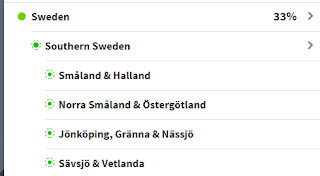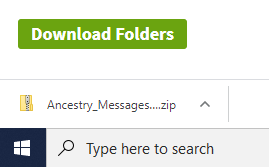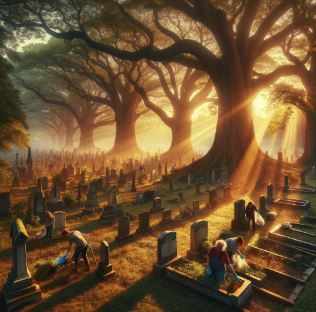My backyard poinsettia is in full bloom, the radio is playing holiday tunes and I should be baking and partying with those I love. Except I'm not. I hope you aren't either. With a reported 16,000,000 million cases and nearly 300,000 deaths in the U.S. from covid as of today per Google, I can't stop thinking about the picture above.
Yes, it is morbid, depressing and haunting. Taken outside the Croatian Church, then located on 23rd Avenue in Gary Indiana on the 21 February 1919, the deceased man in the center in the coffin is my maternal great grandfather that I never met because of his untimely death at age 43 of broncho-pneumonia brought on by influenza. Joseph Kos was one of the estimated 675,000 U.S. deaths from the 1918-1919 H1N1 Pandemic.
We're approaching half way to the number of deceased from 100 years ago and we're not yet close enough to see the end of the spread of covid. That saddens me immensely! For all of the advances in health care in the past century you would think the current death rate would be low. Interesting how we rely on modern medicine when simple old fashioned hand washing, distancing and masks could have significantly lessened the death toll.
My mother, Dorothy Koss Leininger, didn't remember her grandfather as he died when she was an infant but his death changed the course of her life forever. History is repeating itself again and still we haven't learned.
Joseph emigrated from Croatia, then part of Austria-Hungary, in January 1910. This was not his first time in the U.S., as he had initially come in 1893 but returned home to marry Ana Katherine Grdenich on 10 February 1895. Family lore says he joined the military and served in the cavalry but after sustaining a kick to his head from a horse while it was being reshooed, he developed epilepsy and was forced to leave the service. With jobs scarce he decided to return to the U.S. After his arrival in New York he worked as a laborer for the Pullman Company. He's found in Chardon, Geauga, Ohio in the 1910 U.S. federal census as an alien speaking no English.
With his Pullman job, Joseph traveled the country and ultimately ended up in Chicago in 1913. Residing in Pullman housing, he sent for his wife and two children, Mary, my grandmother, and Joseph Jr. (Josip), to join him. Ana was soon pregnant and gave birth to daughter Barbara on 14 Sep 1914 in Blue Island, Cook, Illinois.
Joseph arranged for daughter Mary to wed John (Ivan) Kos, a villager and purported second cousin who had happened to also arrive in Chicago and worked for the Pullman Company. Mary and John wed on 28 January 1917 in Chicago; their first child, my mother, Dorothy, was born in Pullman housing on 14 April 1918.
The family moved sometime in the latter part of 1918, renting a home at 1521 Garfield Street in Gary, Lake, Indiana. Joseph and John found work with the I.I.B. Teaming Company which supplied laborers to U.S. Steel Corporation. To save money, instead of using the available street car, Joseph and John commuted the 1.5 miles to work and back daily via bicycle. With contract tracing unavailable in those days, it is not known where or how Joseph contracted the flu. My grandmother believed it was from work which was likely, as the conditions inside the mill were brutal - unheated, with poor ventilation and large numbers of unmasked men toiling round the clock and then riding home exhausted in a cold rain would lower anyone's resistance to infection. As an immigrant with WW1 being fought overseas and knowing you are the bread winner your family depends on added further stress.
The last photo taken of Joseph, shown above, shows the funeral attendees maskless and not socially distancing. I have no idea why. Perhaps they were mask slackers but I doubt that as my grandmother always washed her hands as soon as she came in from any errand. I suspect they didn't know they should. I suspect that U.S. Steel did not mandate that workers wear a mask. By clicking through the death certificates on Ancestry I can see many men who worked as laborers dying of the same conditions during the same time period as Joseph. Possibly Joseph caught the flu from one of the men who died shortly before him, perhaps not. John also was ill but he recovered.
The man on the far left of the photo was the funeral home director; maskless, he clearly did not require a face covering be worn. The man holding the wreath to the back left of the coffin is John Koss, Joseph's son-in-law. The young man holding the wreath on the right is Joseph Jr. Next to Joseph (look closely) is my grandmother Mary, hidden by a black veil. I like to think she was the only one with any sense to wear the face covering but knowing her well, I think her choice was due to a fashion statement. Next to Mary was her mother, Ana, Joseph's widow. The others in attendance were neighbors and parishioners of the Croatian Catholic Church. Missing was my infant mother and Barbara, Joseph and Ana's youngest daughter. Who was watching those girls is unknown.
How Joseph's untimely death affected my mother was profound, though as a baby she was unaware of the event. John became the only breadwinner in the family and with the loss of Joseph Sr., the family's income was cut in half. Joseph Jr. was forced at age 17 to leave school and seek work. Money would become even tighter as Mary was pregnant with her second child, Anne Marie, who would be born 6 months after Joseph's death.
More tragedies came in quick succession to the family - a scarlet fever epidemic that infected both children required the family to quarantine. With no money for a physician, my grandmother relied on her neighbor's home remedy advice to treat the family. John then had to have a leg amputated as a result of an injury at the mill. When recovered, he could no longer ride his bike to work and had to spend money on the street car. The KKK threatened the family and burned a cross in the empty field in front of their home. A fire started by a candle caused extensive damage and burned my mother's only toy, a doll.
A little over 10 years after Joseph's death the Great Depression hit. John's wages were cut, the family took in boarders, raised vegetables, rabbits and chickens to survive but it wasn't enough. Dorothy, as the eldest, quit high school at the start of grade 10 to work in a hardware store. Her lack of a diploma hindered her job prospects for the rest of her life.
During the current pandemic I've been thinking a lot about the 1918 one. If Joseph hadn't succumbed to the flu would my mother have been able to finish high school? She had always aspired to be a dietician but going back to school was out of the question. Her working enabled Anne Marie and her younger siblings, George and Marilou to obtain their diplomas. How would my life have been different if my mother had found a career she loved and that paid better than the minimum wage jobs she held? Would I be the frugal genealogist I am today if money hadn't been so tight while I was growing up?
My memories of my great grandmother are of an old woman always wearing black who sat quietly in deep thought. What was she thinking about? Never remarrying after the man she loved so dearly died, she spent the next 47 years of her life residing with her adult children, changing residences every few years depending on the needs of their growing families. If Joseph had survived, how would her life have turned out?
My grandmother, the apple of her father's eye, missed him the rest of her life. His death was a loss that could never be replaced. The extra burden of being the sole breadwinner put a strain on my grandfather, John. Would his health have been better and would he have lived a longer life if Joseph had lived?
The pandemic fatigue I'm feeling is put into perspective whenever I compare it to the 1918 pandemic my ancestor's experienced. I do not want my adult children to miss my husband and I as my grandmother missed her father for the remainder of her life. I do not want any grandchildren I may someday have to wonder about the grandparents they didn't get the opportunity to know. I've learned from my family's experiences that thriftiness is beneficial. I don't panic over shortages of goods. I've always kept a fully stocked cupboard and supplement with my garden. My children do the same.
The holidays will be different from past ones for all of us. In a season that personifies hope, I'm remembering the past and hope 2021 will be brighter. I am taking the next two weeks off from blogging but will return in the new year. Be smart - stay safe!

























